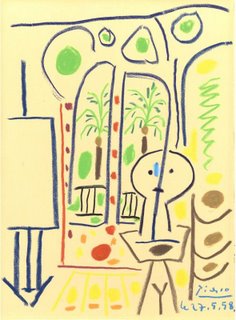L'atelier, by Pablo Picasso. Crayon on paper, 1958.
 Now that I've proven to all of you that I am, in fact, a genius, let me show you a real Picasso. This is a drawing that is too good to have been made by a five-year-old.
Now that I've proven to all of you that I am, in fact, a genius, let me show you a real Picasso. This is a drawing that is too good to have been made by a five-year-old.This is L'atelier, the real thing. Back when Atelier de Cannes was on sale, I was angry that Costco didn't have a better picture of it available on their website, so I searched the internet for a better image, and found this. Had I been smarter, I would have said, "Aha! So the other is a fake!" But I just assumed they were two different versions of the same composition, one good and one not-so-good.
What I really find amusing about all of this is that the fake version, Atelier de Cannes, is so absolutely awful compared to this. I mean, if you were forging a work of art, wouldn't you try to be pretty dang precise? But it honestly looks like whoever forged Atelier de Cannes had the skills of a five-year-old. The forger screwed up the composition, messed up on the thickness of the lines and the vibrancy of the color... I could list much more, but just look at them both. Obviously, a blind man could have made a better forgery.
And now for the moral of our story: Well, our first moral is that, even if you are blind, you too can become a successful creator of fake art. Actually, I should call that the immoral of our story. In my mind, the real moral is this: don't accept crappy art just because it has a big name attached to it. Big names like Picasso or Monet or Van Gogh usually scare us into believing that everything they've ever made is good. But it isn't! Great Moses's ghost, you say, could that really be true? Yes! Everyone accepted the fake Costco Picasso, not because it was good, but because everyone thought it was a Picasso. So, my children, don't let the names of dead guys convince you that something is either good or bad. Unless that dead guy's name is Hitler or something. I mean, pretty much everything associated with him is bad. I suppose Jesus would be an exception to the rule, too. But really, other than those two, it could go either way.
(By the way, L'atelier is French for The Studio, and Atelier de Cannes is French for Studio in Cannes.)




0 Comments:
Post a Comment
<< Home